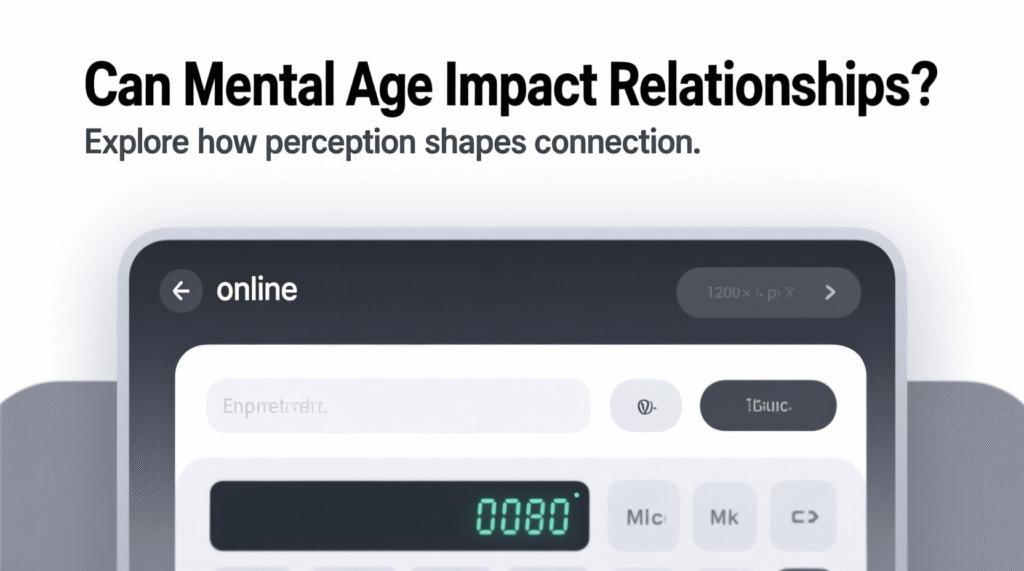
When people talk about compatibility in relationships, they often mention age gaps. But the number of years you’ve lived—your chronological age—isn’t always the biggest factor. What often matters more is your mental age, the maturity level that shapes how you think, feel, and handle challenges.
So, can mental age impact relationships? The answer is yes—sometimes in subtle ways, other times in very obvious ones.
Mental age impacts relationships by influencing communication style, emotional maturity, conflict resolution, and long-term compatibility. Partners with similar mental ages tend to find balance more easily, while mismatched mental ages can lead to both growth opportunities and friction.
To understand the science behind both, read our post on mental age vs IQ test.
What Is Mental Age in a Relationship Context?
- Chronological age = the years you’ve lived.
- Mental age = your emotional and psychological maturity compared to others.
For example, two partners may both be 30 years old, but one thinks and acts like a 40-year-old—planning carefully, avoiding risks—while the other feels more like 22—energetic, adventurous, and carefree.
Visit MentalAgeChecker.com
How Mental Age Shapes Relationships
| Relationship Factor | Lower Mental Age Partner | Higher Mental Age Partner |
|---|---|---|
| Communication | Playful, impulsive, emotionally expressive | Calm, reflective, measured responses |
| Conflict Handling | Quick reactions, may avoid responsibility | Thoughtful, seeks resolution |
| Goals & Priorities | Living in the moment | Focused on stability & planning |
| Social Style | Loves spontaneity and fun | Prefers deeper, steady connections |
Explore how does mental age affect personality to see how your traits influence connection with others.
Real-Life Scenarios
1. Younger Mental Age in a Relationship
A 35-year-old who feels 25 may bring excitement and fun to the partnership. But if the partner expects more responsibility, friction can develop.
2. Older Mental Age in a Relationship
A 25-year-old who feels 40 may crave long-term commitment and financial stability, while their partner is still exploring. This can create misalignment, but also balance if both respect each other’s pace.
3. Balanced Mental Ages
When partners’ mental ages align, decision-making and goals often sync naturally. These couples typically find smoother communication and shared vision.
Read how does mental age affect relationships for deeper insights into compatibility and emotional balance.
Tips for Couples With Different Mental Ages
- Talk openly about expectations and maturity levels.
- Balance strengths: let the playful partner bring joy, and the mature partner bring grounding.
- Practice empathy: see challenges through your partner’s perspective.
- Grow together: mental age isn’t fixed—experiences can shift it over time.
Why It Matters
Understanding mental age in relationships isn’t about labeling one person as “immature” or “too serious.” It’s about recognizing differences in mindset and learning how to navigate them. With awareness, couples can turn differences into opportunities for balance and growth.
Curious about where you fall? Try the Mental Age Calculator to see how your mindset compares with your chronological age.
FAQs
Q: Is mental age more important than real age in relationships?
In many cases, yes. Emotional maturity often has more impact on compatibility than the number of years lived.
Q: Can a mismatch in mental age work?
Yes—if both partners respect differences and adapt, mismatched mental ages can complement each other.
Q: Does mental age affect attraction?
It can. Some are drawn to playful energy, while others value steadiness and wisdom.
Q: Can mental age change during a relationship?
Absolutely. Experiences, growth, and shared challenges often shift mental age over time.
Final Thoughts
Mental age does impact relationships—sometimes more than chronological age. It affects how partners communicate, resolve conflict, and plan for the future. The key is not matching perfectly, but finding a balance that brings out the best in both people.
- Understanding the nuances of mental age vs emotional age is crucial for couple compatibility.
- Your partner might notice that how you act daily reflects a different maturity level than expected.
- It is often debated when men fully mature and how that delays serious commitment.
- Conversely, knowing when women reach maturity helps balance relationship expectations.
- Couples can sometimes use a maturity vs mental age test to see if they are on the same page.
- Conflict resolution often relies on finding ways to improve emotional intelligence together.
- Your psychological growth rate determines how personality is affected and how you bond with others.